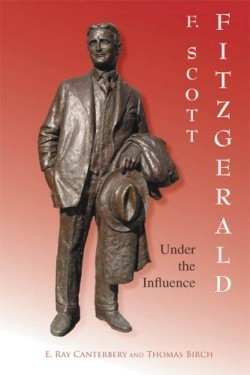F. Scott Fitzgerald
Under the Influence
When a biographer (or, in this case, biographers) undertakes to write the life of a person who is already the subject of previous works, it is usually either the result of a discovery of a new cache of documents, or because the biographer feels the subject has been misunderstood. Thanks to at least half a dozen earlier biographies, there are probably few rocks not yet overturned in the telling of F. Scott Fitzgerald’s life. Instead, these authors seek to reclaim the jazz age author from critics who, they feel, have consistently failed “to fully appreciate Fitzgerald’s intellectual reach and grasp of the social and economic forces defining not just American but Western civilization.”
Economists and university professors, Canterbery and Birch are well grounded in the economic theories prevalent in the early twentieth century. Canterbery has authored several highly regarded economic texts, including The Making of Economics, long required reading in many upper-level economics classes; Birch wrote The Economic Design of Walden.
The authors describe Fitzgerald and his wife, Zelda, as mythic figures of 1920s capitalism and excess, making and—more importantly—spending what would be millions in today’s dollars. Fitzgerald admired Karl Marx and called himself a socialist throughout his adult life. It’s the economic thought of Thorstein Veblen, author of The Theory of the Leisure Class, however, that Canterbery and Birch see as having the greatest influence on Fitzgerald, declaring The Great Gatsby to be “the supreme Veblenian parable of conspicuous consumption.” It’s an argument first made by Canterbery several years ago in the Journal of Economic Issues, greatly expanded and contextualized here. No other biographer has made the Veblen—Fitzgerald connection, and despite the fact that Fitzgerald never mentions Veblen by name in any of his published works, Canterbery and Birch make a convincing case for the economist’s influence on the writer.
Less convincing is their secondary effort to correct what they see as another failing of recent Fitzgerald scholarship—the Zelda revisionists, who have “downplay[ed] the severity of Zelda’s mental illness … [and] have exaggerated any rational judgment of her artistic talents.” Canterbery and Birch continue: “Worse, they have claimed that Scott caused her terrible illness.” In this case, the authors are out of their element, arguing from their passions rather than from their expertise. At times they engage in a critical blame game, countering the revisionists with statements such as “Zelda pushed Scott toward an extravagant and reckless lifestyle that, given his predilection for drink, was irresistible.” While they may very well be right, their argument lacks needed depth.
Those who are looking to read their first biography on Fitzgerald should look at Matthew Bruccoli’s Some Sort of Epic Grandeur, which remains the definitive work. Those who are familiar with Fitzgerald scholarship and are interested in the writer’s influences should certainly add this volume to their personal libraries.
Reviewed by
Erik Bledsoe
Disclosure: This article is not an endorsement, but a review. The publisher of this book provided free copies of the book to have their book reviewed by a professional reviewer. No fee was paid by the publisher for this review. Foreword Reviews only recommends books that we love. Foreword Magazine, Inc. is disclosing this in accordance with the Federal Trade Commission’s 16 CFR, Part 255.

